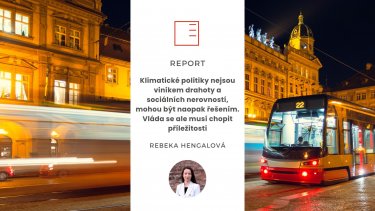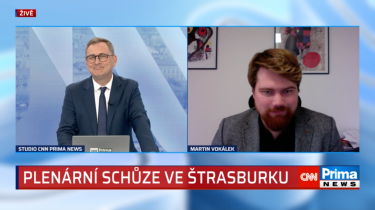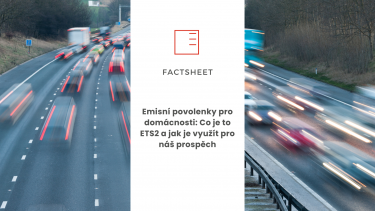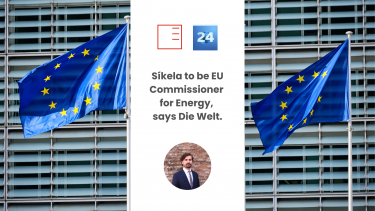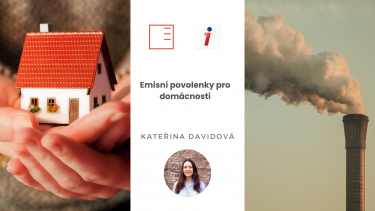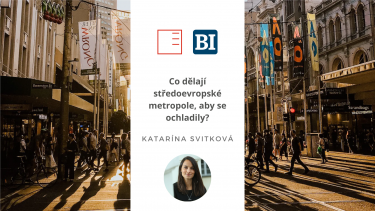Report | Battery circularity in the automotive industry as an opportunity for the Czech Republic
The report "Battery Circularity in the Automotive Industry as an Opportunity for the Czech Republic" addresses key issues in the development of the battery industry in the Czech Republic, with an emphasis on the circular economy, recycling and reuse of batteries. The study, which was produced in cooperation between EUROPEUM think tank and experts in the field of batteries and electromobility, shows that although the Czech market is still lagging behind in the development of battery production and recycling, its potential is huge - from raw material extraction to component production to battery recycling, which would significantly strengthen the resilience and environmental sustainability of the Czech economy.
Show more
Report | Climate policies are not the culprit of high costs and social inequalities, but can be the solution. But the government must seize the opportunity
This week, the Government will discuss in the third reading an amendment to the Emissions Trading Act, which also includes so-called household allowances. Under ETS2, these will charge for emissions from road transport and local heating - so they can help invest in infrastructure, renewable energy and support socially vulnerable groups. EUROPEUM Institute research fellow Rebeka Hengalová and others write.
Show moreCNN Prima News | Plenary meeting in Strasbourg to decide on budget and loan to Ukraine
MEPs in Strasbourg will vote on a loan of up to 900 billion crowns to Ukraine. This should be covered by the proceeds from frozen Russian assets. Other topics to be discussed include the EU's draft budget for next year and the situation in Lebanon. Martin Vokálek, executive director of EUROPEUM Institute, commented for CNN Prima News.
Show more
Hospodářské noviny | Let's keep our no and think about how to build Wall Street in Europe
Europe has a problem compared to other large economies in the world. It is lagging behind. What to do about it? The new European Commission has changed priorities compared to the previous one - more on the economy, less on the climate. How does this suit the Czech Republic and how should it approach it? Deputy director of EUROPEUM Institute Viktor Daněk commented for podcast Ranní brífink of Hospodářské noviny.
Show moreFactsheet | Emission allowances for households: What is ETS2 and how to use it to our advantage
The extension of the emissions trading system for local heating and road transport, the so-called ETS2, is due to come into effect in 2027. ETS2 now needs to be adopted into Czech legislation under the Emissions Trading Act. In this factsheet you will find basic facts and answers to questions that the Czech public often asks. Please also see the attached materials from the organisations that contributed to the factsheet.
Show more
Czech Radio | Jozef Síkela is to be EU Commissioner for International Partnerships. The opposition considers the portfolio weak and invisible
Czech Industry Minister Jozef Síkela is to be the Commissioner for International Partnerships in the new European Commission. EU chief executive Ursula von der Leyen announced this at a press conference in Strasbourg. Political analysts are divided on Síkela's portfolio, they say the government expected more. Viktor Daněk, deputy director of EUROPEUM Institute, commented for Czech Radio.
Show moreČT24 | Síkela to be EU Commissioner for Energy, says Die Welt
European Commission President Ursula von der Leyen has already decided on key positions in her new team. The energy portfolio should go to Czech Industry and Trade Minister Jozef Sikela, the Die Welt website reported citing its sources. Prime Minister Petr Fiala will not comment on the information, a government spokeswoman said. Viktor Daněk, Deputy Director of EUROPEUM Institute, commented for ČT24.
Show moreHospodářské noviny | The Czech Republic can raise billions to fight transport poverty, but the government is hesitant on key legislation
A household is at risk of transport poverty if it either spends a large proportion of its budget on transport needs, cannot meet all its transport needs, or has no cheaper alternatives to private or public transport. According to a study by the analytical institute STEM, on average three percent of households in the Czech Republic are at risk of this situation. Rebeka Hengalová, a researcher at EUROPEUM Institute, comments for Hospodářské noviny.
Show moreiDnes.cz | Emission allowances for households
By postponing the approval of emission allowances for households, the Czech Republic is harming itself. If the permits are not approved, the Czech Republic will have to come up with other instruments to achieve climate neutrality. Kateřina Davidová, Senior Research Fellow at EUROPEUM Institute, commented on this issue.
Show more
Balkan Insight | City Heat: What Central European Capitls Are Doing To Keep Cool
With another heatwave expected this week following record temperatures in July, cities in Central Europe are belatedly taking action – but politics keeps getting in the way. Katarina Svitkova, an Associate Research Fellow at EUROPEUM Institute specializing on climate change, urbanism and sustainability, comments for Balkan Insight.
Show more
Staroměstské náměstí 4/1
Prague 1 - Staré Město
110 00
tel.: +420 212 246 552
email: europeum@europeum.org
https://www.europeum.org

